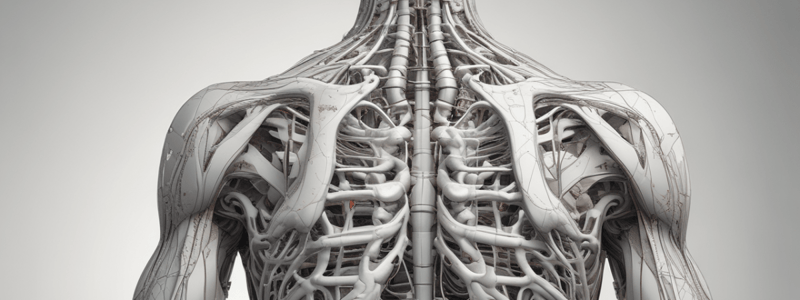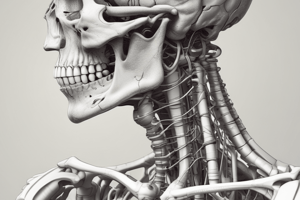Podcast
Questions and Answers
What type of joint allows for movement in two planes and has oval-shaped articulating surfaces?
What type of joint allows for movement in two planes and has oval-shaped articulating surfaces?
- Ball And Socket Joint
- Condyloid Joint (correct)
- Pivot Joint
- Hinge Joint
Which type of joint has flat articulating surfaces that glide past each other and allows for limited movement in one plane?
Which type of joint has flat articulating surfaces that glide past each other and allows for limited movement in one plane?
- Condyloid Joint
- Hinge Joint
- Ball And Socket Joint
- Gliding Joint (correct)
What type of joint allows for rotation around a single axis?
What type of joint allows for rotation around a single axis?
- Pivot Joint (correct)
- Condyloid Joint
- Hinge Joint
- Gliding Joint
Which type of joint has articulating surfaces shaped like a hinge and allows for movement in one plane?
Which type of joint has articulating surfaces shaped like a hinge and allows for movement in one plane?
What type of joint allows for movement in multiple planes and has a rounded head that fits into a cup-like depression?
What type of joint allows for movement in multiple planes and has a rounded head that fits into a cup-like depression?
Which joint in the arm allows for circumduction?
Which joint in the arm allows for circumduction?
Which organization publishes resources that set standards and guide professional nursing practice in the United States?
Which organization publishes resources that set standards and guide professional nursing practice in the United States?
What is the purpose of the standards set by the American Nurses Association and other organizations?
What is the purpose of the standards set by the American Nurses Association and other organizations?
What is the focus of nursing, according to the American Nurses Association?
What is the focus of nursing, according to the American Nurses Association?
How many standards of professional practice are set by the American Nurses Association?
How many standards of professional practice are set by the American Nurses Association?
What is the 'who' of nursing practice, according to the American Nurses Association?
What is the 'who' of nursing practice, according to the American Nurses Association?
What is the purpose of the Code of Ethics for Nurses?
What is the purpose of the Code of Ethics for Nurses?
Which publication by the American Nurses Association describes a professional nurse's scope of practice?
Which publication by the American Nurses Association describes a professional nurse's scope of practice?
What is the goal of nursing care, according to the American Nurses Association?
What is the goal of nursing care, according to the American Nurses Association?
Flashcards are hidden until you start studying
Study Notes
Types of Body Joints
Condyloid Joint
- Also known as ellipsoidal joint
- Articulating surfaces are oval-shaped
- Allows for movement in two planes (flexion, extension, abduction, adduction, circumduction)
- Examples: wrist joint, metacarpophalangeal joints
Gliding Joint
- Also known as plane joint
- Articulating surfaces are flat and glide past each other
- Allows for limited movement in one plane (gliding, sliding)
- Examples: intercarpal joints, intertarsal joints, sternoclavicular joint
Pivot Joint
- Also known as rotary joint
- One bone rotates within a ring formed by another bone
- Allows for rotation around a single axis (rotation)
- Examples: atlanto-axial joint, proximal radioulnar joint
Hinge Joint
- Articulating surfaces are shaped like a hinge
- Allows for movement in one plane (flexion, extension)
- Examples: elbow joint, knee joint, ankle joint, interphalangeal joints
Ball And Socket Joint
- Also known as spheroidal joint
- One bone has a rounded head that fits into a cup-like depression in another bone
- Allows for movement in multiple planes (flexion, extension, abduction, adduction, rotation, circumduction)
- Examples: shoulder joint, hip joint
Types of Body Joints
Condyloid Joint
- Also known as ellipsoidal joint, characterized by oval-shaped articulating surfaces
- Enables movement in two planes, including flexion, extension, abduction, adduction, and circumduction
- Found in wrist joint and metacarpophalangeal joints
Gliding Joint
- Also known as plane joint, featuring flat articulating surfaces that glide past each other
- Allows for limited movement in one plane, including gliding and sliding
- Examples include intercarpal joints, intertarsal joints, and sternoclavicular joint
Pivot Joint
- Also known as rotary joint, where one bone rotates within a ring formed by another bone
- Enables rotation around a single axis
- Found in atlanto-axial joint and proximal radioulnar joint
Hinge Joint
- Characterized by hinge-shaped articulating surfaces
- Enables movement in one plane, including flexion and extension
- Examples include elbow joint, knee joint, ankle joint, and interphalangeal joints
Ball And Socket Joint
- Also known as spheroidal joint, featuring a rounded head that fits into a cup-like depression
- Enables movement in multiple planes, including flexion, extension, abduction, adduction, rotation, and circumduction
- Found in shoulder joint and hip joint
Regulations and Standards in Nursing
- Multiple organizations set standards for nursing care, including the American Nurses Association (ANA), state Nurse Practice Acts, agency policies and procedures, federal regulators, and other professional nursing organizations.
- These standards ensure safe and competent care is provided to the public.
American Nurses Association (ANA) Standards
- The ANA publishes two resources that set standards and guide professional nursing practice in the United States:
- The Code of Ethics for Nurses
- Nursing: Scope and Standards of Practice
- The Code of Ethics for Nurses establishes an ethical framework for nursing practice across all roles, levels, and settings.
Nursing: Scope and Standards of Practice
- This resource describes a professional nurse’s scope of practice and defines the who, what, where, when, why, and how of nursing.
- It sets 18 standards of professional practice that all registered nurses are expected to perform competently.
- The "who" of nursing practice refers to nurses who have been educated, titled, and maintain active licensure to practice nursing.
- The "what" of nursing is defined as integrating the art and science of caring, focusing on health and human functioning, preventing illness and injury, facilitating healing, and alleviating suffering through compassionate presence.
- Nursing involves diagnosing and treating human responses and advocating for individuals, families, groups, communities, and populations, recognizing the connection of all humanity.
Studying That Suits You
Use AI to generate personalized quizzes and flashcards to suit your learning preferences.




